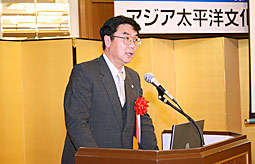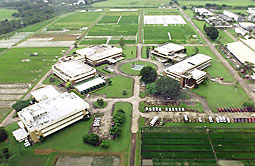 The Winner of the 6th Iue Asia Pacific Culture Prize : International Rice Research Institute (IRRI)
The Winner of the 6th Iue Asia Pacific Culture Prize : International Rice Research Institute (IRRI)


Outline of the International Rice Research Institute(IRRI)
The International Rice Research Institute (IRRI) was established in 1960 by the Ford and Rockefeller Foundations in cooperation with the Philippine government. Its headquarters which feature modern laboratories, training and accommodation facilities, and a 252 hectare experimental farm lie next to the main campus of the University of the Philippines Los Banõs, about 65 kilometers southeast of the Philippine capital, Manila. Based in the Philippines, IRRI is the oldest and largest international agricultural research institute in Asia. It is an autonomous, nonprofit rice research and training organization with offices in 10 Asian nations as well as activities in Africa that included the opening of an IRRI office in Mozambique in 2006. IRRI’s mission is to reduce poverty and hunger, improve the health of rice farmers and consumers, and ensure that rice production is environmentally sustainable. It works closely with most rice producing and consuming countries and their national agricultural research and extension systems as well as farming communities and a range of international, regional, and local organizations. In partnerships with these national systems, IRRI conducts research and provides training and education for those helping rice farmers by disseminating information and proven, sustainable technologies.
Reason for Selecting IRRI for the 6th Iue Asia Pacific Culture Prize
 Winner: International Rice Research Institute (IRRI)
Winner: International Rice Research Institute (IRRI)
The International Rice Research Institute (IRRI) successfully bred a high yield type of rice known as IR-8 in 1966, and, after that, has produced many improved high yield brands using modern breeding technologies. As a result, developing nations of Asia saw an increase in food production dubbed the “Green Revolution”. It freed Asia from hunger, but it also led to an obvious gap between areas that reaped the benefits and those that did not. Outside of Asia, Africa has yet to see the benefits of the “Green Revolution”. To solve these remaining issues, the IRRI has of recent been working to diffuse the Green Revolution to Africa.
This high yield rice does require the use of agrochemicals, hence giving rise to environmental aggravation by soil degradation, etc. Though an aggravated global environment certainly cannot be considered a byproduct of the Green Revolution, it is important to recognize the present situation of progressively worsening environments worldwide. Reacting to the world’s transition from the age of hunger to the age of the environment, the IRRI rewrote their research policy in 2004 on the opportunities presented by the “International Year of Rice”. On the slogan of “Greening the Green Revolution”, they started widespread research activities into problems facing the modern-day world such as hunger and the environment, agrochemicals, chemical fertilizers and residual substances, soil degradation, water use and quality, biodiversity, climate change, uses of biotechnology and more. They have produced results one after another in environmental fields such as activities to stop the use of hazardous agrochemicals in Vietnam.
In this way, the IRRI has shifted its focus from the development of high yield rice brands to the environment, yet that foundation is none other than to eliminate hunger through the increased production of rice. Recent pillars of the IRRI’s strategy are reduced poverty through the development and diffusion of better rice growing techniques, sustainable rice farming through the maintenance and improvement of the environment, improved nutrition and health of rice growers and consumers, and disclosure and diffusion of information on rice growing technologies. Compared to their earlier strategic objectives, they are flexibly addressing the serious issues facing modern society. The IRRI was selected for the 6th Iue Asia Pacific Culture Prize because of their steadfast contributions to Asia and the world without undoing their consistent rice growing approach, and the high expectations of even greater future contributions to mankind.






